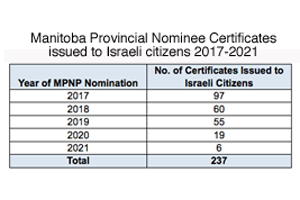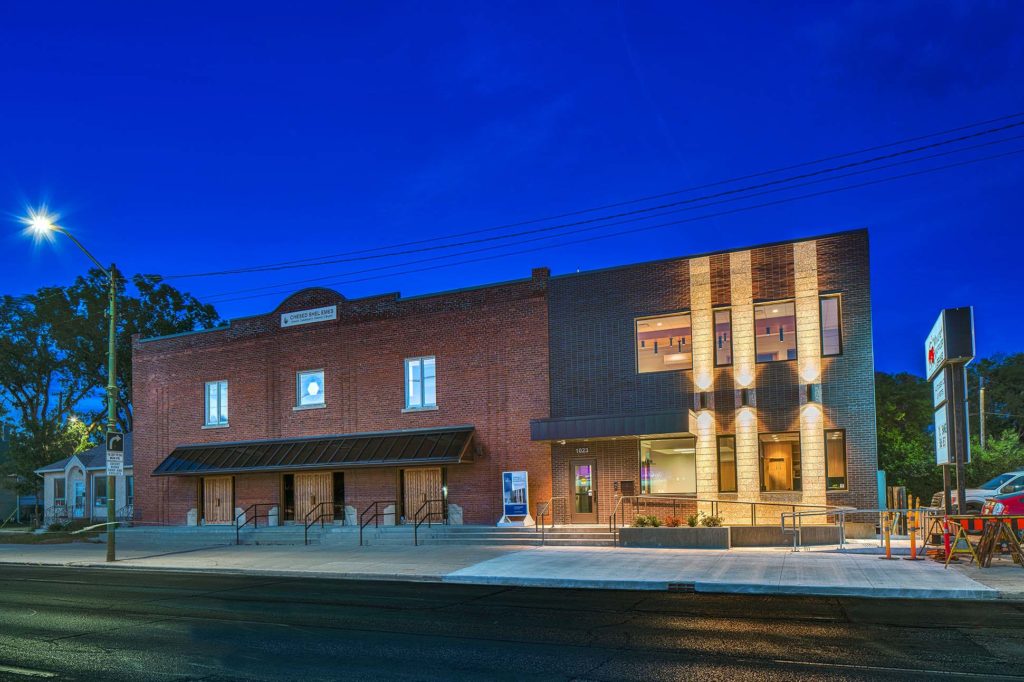Local News
Increase in allocations to Provincial Nominee Program likely to lead to influx of Israeli immigrants to Winnipeg
 By BERNIE BELLAN From time to time we’ve had articles on this website that refer to the Provincial Nominee Program (PNP). If you’re not familiar with that program, here’s a summary of how it works:
By BERNIE BELLAN From time to time we’ve had articles on this website that refer to the Provincial Nominee Program (PNP). If you’re not familiar with that program, here’s a summary of how it works:
Although the Federal government is ostensibly responsible for immigration to Canada, beginning in 1998, the Federal government (when the Minister of Immigration at that time was our own Lloyd Axworthy), allowed Manitoba to “nominate” a small number of individuals to immigrate to Manitoba, to fill labour needs in the province at that time.
Here is how the program first began, according to information on a Province of Manitoba website, and how it has developed since:
“Manitoba was the first province to launch a Provincial Nominee Program (PNP) in 1998. As a small province with few newcomers, it needed the PNP to promote itself as a destination of choice to skilled immigrants. Since then, Manitoba has been a tremendous immigration success story. Thanks to the Manitoba PNP, immigration has played a major role in Manitoba’s population, labour force, and economic growth.
“The Manitoba Provincial Nominee Program (MPNP) was Canada’s first PNP. It became a permanent immigration program in 1998.
“The program launched to help grow the province’s economy through immigration, based on their economic and labour market needs.
“In its first year, the MPNP welcomed 418 new immigrants. Today, the province nominates more than 4,000 new immigrants through the program per year. (Ed. note: The information on the website where we obtained information about the PNP is now quite out of date. The province nominated 6,275 individuals as candidates for immigration under the program in 2021.)
“Manitoba has been very successful with the MPNP. In fact, without it, Manitoba’s GDP would be up to 30 per cent lower.
“Manitoba is also popular among newcomers. Having a friend or relative in Manitoba helps you to immigrate through the MPNP. In addition, over 90 per cent of provincial nominees get a job in their first year. The province’s retention rate is high with almost 90 per cent choosing to stay in the province.
“The Manitoba Provincial Nominee Program (MPNP) seeks recent graduates, skilled workers, businesspeople and their families with the intention and ability to successfully settle and economically establish in Manitoba as permanent residents. Manitoba makes it easy to immigrate and settle in our province.
“The Skilled Workers Stream is locally driven and based on the needs of Manitoba employers. We select internationally trained and experienced workers who have the skills needed in the local labour market, and nominate them to receive Canadian permanent resident visas to settle and work in Manitoba.”
Under the program, prospective immigrants are granted “points” based upon various criteria that they meet. Points are given for skill levels, educational background, and whether they have family members already living in Manitoba.
In 2016 immigration consultant Eka Mednikov wrote an article for our paper describing how important the Provincial Nominee program has been in helping Israelis, in particular, move here. Eka also explained how the Jewish Federation has worked hand in hand with the provincial government to bring newcomers here:
“The Jewish Federation of Winnipeg has the option to support applicants interested in settling in Manitoba and become part of the Jewish community in Winnipeg. The minimum requirements are: Jewish life style, being between the ages of 21 and 45, a post-secondary education, two years of work experience and knowledge of English. Eligible applicants are asked to travel to Winnipeg for an exploratory visit during which time they will attend an interview with a Jewish Federation representative and a Manitoba Provincial Nominee Program Immigration Officer. Due to very high demand, to obtain permanent Canadian residency under this program might take between three to five years.
“Applicants who have family members who have resided at least one year in Manitoba can use the support of their family members for their immigration process. Interested applicants are screened according to a points system that is based upon the age, education, work experience and level of English of the applicant.
“The friends’ support stream is very similar to family support with one unfortunate difference: Points granted for having friends in the province are minimal and in the past two years I haven’t seen anyone able to move here relying upon friends’ support.
“Foreign workers coming to Manitoba on a work permit are eligible to apply for residency under the Manitoba Provincial Nominee Program after six months of continuous employment and a job offer from a Manitoba employer. This is the way used by many truck drivers to move to Canada from Israel.”

Recently we were contacted by a representative for Jon Reyes, Minister of Advanced Education, Skills and Immigration for the Province of Manitoba, who told us that, after a lull period in the Provincial Nominee program that came about in 2020 as a result of the onset of Covid, the province is now accepting a large number of immigrants through the program once again.
We were curious to know how many immigrants had been coming from Israel under the program, so we posed some questions to Minister Reyes.
We asked the Minister: “How many immigrants is the province hoping to bring in under that program this year?”
Minister Reyes responded: Last year, the Manitoba Provincial Nominee Program (MPNP) nominated a record 6,275 candidates as individuals who can then apply to Immigration, Refugees and Citizenship Canada for permanent residence. The program’s nomination allocation has not been finalized for 2022. The Manitoba government is waiting to receive its MPNP 2022 allocation from the federal government in the near future.”
We asked the Minister how many immigrants from Israel have come here through the PNP?
In the table accompanying this story you can see the number of Israeli citizens who have come to Manitoba under the Provincial Nominee Program between 2017 and 2021. The drop-off in numbers in 2020 and 2021 is directly attributable to the onset of Covid. Many individuals who had contacted the Jewish Federation about coming to Manitoba under the PNP delayed coming here for exploratory visits.
We also asked the Minister this question: “Are there particular classes of immigrants that Manitoba is wanting to recruit? e.g., computer programmers, nurses, etc. (also good hockey players)”
The Minister responded:
“The MPNP is an economic program that aims to address labour market needs by nominating skilled workers and business investors who satisfy program criteria – and who are employable in their areas of professional experience – across all industry sectors.
“Based on the Manitoba government’s Labour Market Outlook 2021-2025 and recent Manitoba occupations gap analyses for the 2022-2026 period, the need for the following occupations is expected to be acute until 2026, given new and expanding businesses and organizations and replacement of retiring workers:
· Retail salespersons
· Transport truck drivers
· Nurse aides, orderlies and patient service associates
· Retail and wholesale trade managers
· Registered nurses and registered psychiatric nurses
· Food counter attendants, kitchen helpers and related support occu- pations; and
· Elementary school and kindergarten teachers
Going forward, the Jewish Federation of Winnipeg is anticipating quite a large increase in the number of immigrants who will be coming here under the PNP. As Dalia Szpiro, GrowWinnipeg Director for the Federation, told me recently, there is a large backlog of prospective immigrants who delayed coming here for exploratory visits. In the past little while many individuals have now been coming here on those exploratory visits.
In our next issue we hope to have detailed information from the Federation about the number of individuals who are hoping to come here under the PNP with the assistance of the Jewish Federation.
Local News
Thank you to the community from the Chesed Shel Emes

We’re delighted to share a major milestone in our Capital Campaign, “Building on our Tradition.” Launched in November 2018, this campaign aimed to replace our outdated facility with a modern space tailored to our unique needs. Our new building is designed with ritual at its core, featuring ample preparation space, Shomer space, and storage, creating a warm and welcoming environment for our community during times of need.
We’re grateful to the nearly 1,000 generous donors who contributed over $4 million towards our new facility. A $750,000 mortgage will be retired in November 2025, completing this monumental project in just seven years.
We’re also thrilled to announce that our Chesed Shel Emes Endowment Fund has grown tenfold, from $15,000 to $150,000, thanks to you, the Jewish Foundation of Manitoba’s FundMatch program, and Million Dollar Match initiative in 2024. Our fund helps ensure that everyone can have a dignified Jewish funeral regardless of financial need.
As we look to the future, our goal remains to ensure the Chevra Kadisha continues to serve our community for generations to come. Our focus now shifts to replenishing our savings account and growing our JFM Endowment fund.
We’re deeply grateful for your support over the past several years.
It’s our privilege to serve our community with care and compassion.
With sincere appreciation,
Campaign cabinet: Hillel Kravetsky, Gerry Pritchard, Stuart Pudavick,
Jack Solomon, and Rena Boroditsky
Murray S. Greenfield, President
Local News
Winnipeg Beach Synagogue about to celebrate 75th anniversary

By BERNIE BELLAN (July 13) In 1950 a group of cottage owners at Winnipeg Beach took it upon themselves to relocate a one-room schoolhouse that was in the Beausejour area to Winnipeg Beach where it became the beach synagogue at the corner of Hazel and Grove.
There it stayed until 1998 when it was moved to its current location at Camp Massad.
On August 2nd members of the synagogue will be holding a 75th anniversary celebration.

As part of the celebration anyone who is a descendant or relative of any of the original members of the first executive committee (as seen in the photo here) is invited to attend the synagogue that morning.
If you are a relative please contact Abe Borzykowski at wpgbeachshule@shaw.ca or aborzykowski@shaw.ca to let Abe know you might be attending or for more information about the 75th anniversary celebration.
We will soon be publishing a story about the history of the beach synagogue, which is something I’ve been writing about for over 25 years.
Local News
Vickar Family cuts ribbon on new Tova Vickar and Family Childcare Centre

By MYRON LOVE In the words of Larry Vickar, the Shaarey Zedek’s successful Dor V’ Dor Campaign “is not only a renewal of the synagogue but truly a renewal movement of Jewish life in our community.”An integral part of that renewal movement was the creation of a daycare centre within the expanded synagogue. On Monday, June 23, Larry and Tova Vickar cut the ribbon, thereby officially opening the Tova Vickar and Family Childcare Centre in the presence of 100 of their family members, friends and other supporters of the project.
The short program preceding the morning ribbon-cutting began with a continental breakfast followed by a welcome by both Fanny Levy, Shaarey Zedek’s Board President, and Executive Director Dr. Rena Secter Elbaze. In Elbaze’s remarks, she noted that Larry and Tova wanted their family (including son Stephen and family, who flew in from Florida) and friends at the event to celebrate the opening of the Tova Vickar and Family Childcare Centre, “not because of the accolades, but because, as Larry put it, he hopes that their investment in the congregation will inspire others to do the same.”
“When Larry and I spoke about what this gift meant to him and the message he wanted people to take away,” she continued, “I couldn’t help but connect it to the teachings of Reb Zalman Schachter-Shalomi whose book – Age-ing to Sage-ing – changes the whole way we look at the concept of ageing and basing it on our ancestral teachings.”
She explained that his concept of “Sage-ing” is based on three key ideas – Discover your meaning and purpose; accept our mortality and think about the legacy you want to leave.
“Larry spoke about these exact concepts when we met,” she said.
Elbaze also noted the presence of Shaarey Zedek’s newly-arrived senior Rabbi Carnie Rose, former Rabbi Alan Green, and area MLAs Mike Moroz and Carla Compton.
Larry Vickar expressed his great appreciation for all those in attendance. “Tova and I are deeply moved to stand here with you today for this important milestone in our community”, he said. “We are grateful to be surrounded by all of you, the people we care about, our family and friends… you who have touched our lives and played some part in our journey.”
